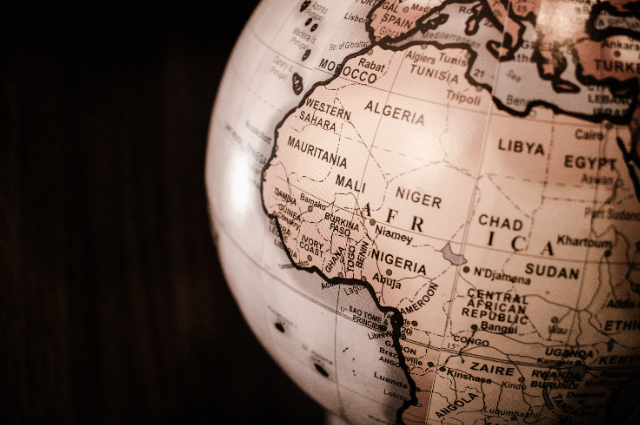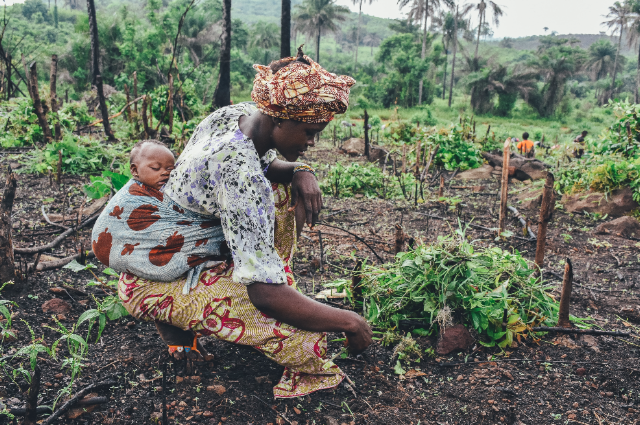
Photo by James Wiseman on Unsplash
Africa's historical trajectory resounds with the cacophony of colonial conquests, a symphony of domination that lingers as shadowy vestiges in contemporary narratives. The Berlin Conference of 1884-1885, a convoluted geopolitical assembly masquerading as diplomacy, dissected the continent into arbitrary parcels of possession, igniting the torch of colonization. The Belgian Congo, a macabre theater orchestrated by King Leopold II, stands as a glaring exemplar. This marred epoch transmuted the Congo's natural bounty into instruments of human suffering, a grim testimonial of the exploitation that infested Africa's heart. The post-colonial era ostensibly heralded freedom, but its legacy is a haunting continuum of exploitative economic frameworks that perpetuate the cycle of dependence. Similarly, the transatlantic slave trade is a haunting illustration of historical exploitation that has indelibly marked Africa's narrative. European powers and their counterparts in the Americas engaged in a reprehensible enterprise, forcibly capturing and transporting millions of Africans across the Atlantic for labor on plantations. This inhumane system perpetuated a cycle of suffering, leaving a profound legacy of intergenerational trauma and societal disruption that endures to this day.
The economic lexicon of modern Africa reverberates with the echoes of neocolonial power dynamics, weaving a tale of profound imbalance. Zambia's copper mining sector, once a vanguard of economic optimism, became ensnared in a cycle of extraction and exportation that ceded control to multinational conglomerates. Nigeria, the oil-rich behemoth, has wrestled with oil conglomerates that glean profits eclipsing the nation's coffers. The pernicious resource curse encapsulates this very predicament, as abundant resources paradoxically enslave nations to economic fragility, perpetuating the chasm between resource-rich nations and economic autonomy. A classic illustration of this economic exploitation is the exportation of raw materials without equitable compensation. The mining industry in the Democratic Republic of Congo provides a case in point. Coltan, an indispensable component of modern electronic devices, is extracted under perilous conditions, yet its exorbitant market value is disproportionately accrued by transnational corporations. This perpetuates a cycle of dependency on external entities while stifling local development, a modern-day manifestation of economic vassalage.
Cultural exploitation in Africa stands as an eloquent testimony to the surreptitious manner in which artistic expressions, age-old traditions, and intrinsic identities are methodically commodified and manipulated for extrinsic gains, surreptitiously corroding the very essence of indigenous cultures and perpetuating a disconcerting continuum of power imbalance. The rhythmic beats of Afrobeat, a musical leviathan birthed from Africa's heart, found their way into global pop anthems, shrouded in a cloak of appropriation that robs their creators of due recognition. The ostentatious displays of African motifs and textiles that grace Western runways often belie the struggles of the artisans who weave their heritage into these creations. The example of the Maasai people, whose beadwork became emblematic of high-end fashion, illustrates how culture can metamorphose into a currency divorced from its creators, underscoring the importance of cultural preservation and respect. Consider the example of African textiles. The irony is palpable: the very cultures that have been marginalized are now repackaged and sold at premium prices, while the original artisans remain ensnared in a cycle of poverty. Cultural exploitation amplifies social disparities through the erasure of indigenous cultures and the imposition of dominant cultural norms. In many African countries, languages, and traditions were suppressed under colonial rule, perpetuating a hierarchy where Eurocentric cultures were exalted. The persistence of this cultural hegemony is evident in media representation, where Eurocentric beauty standards often overshadow indigenous aesthetics, reinforcing a damaging cycle of self-esteem issues and cultural devaluation.

Photo by Annie Spratt on Unsplash
Africa's ecological bounty has often met the scythe of exploitation, a Faustian exchange where environmental vitality is bartered for transient gains. The Amazon rainforest, often hailed as the lungs of the Earth, plays a similar role in Africa's context, particularly the Congo Basin. The Congo, a reservoir of biodiversity and carbon sequestration, suffers from the voracious appetite for timber and arable land. Nigeria's Niger Delta, an ecologically fragile region, exemplifies the fallout of environmental exploitation. The extraction of oil, ostensibly a source of wealth, has left a legacy of ecological devastation and human suffering. Oil spills contaminate waterways, rendering fisherfolk's nets barren, while the air resonates with the discordant symphony of unchecked gas flaring. In this case, the exploitation of resources comes at an unbearable cost – a reminder that the environment's exploitation is inexorably linked to human dignity.
At its zenith, social exploitation materializes as a manifestation of hegemony, wherein those occupying privileged positions perpetuate their dominance to consolidate and amplify their advantages. This often results in the perpetuation of marginalized groups in subordinate roles. For instance, during colonial times, indigenous populations were systematically subjugated under foreign rule, with access to resources, education, and decision-making power being withheld, engendering enduring disparities. The symbiotic relationship between social exploitation and economic mechanisms is particularly evident in Africa's history. In feudal societies, economic ownership translated into social hierarchy, solidifying a system where power and wealth were concentrated in the hands of a select few. In a contemporary context, the exploitation of agricultural laborers in certain African countries parallels this historical model, as these laborers are subjected to exploitative conditions, low wages, and minimal social protections, perpetuating cycles of economic disenfranchisement.
Post-colonial governance in Africa represents a labyrinthine tableau, where the legacy of colonial rule has cast long shadows over the intricate tapestry of political systems and leadership paradigms. One salient facet of post-colonial governance in Africa is the omnipresent struggle for the consolidation of democratic institutions and practices. Despite significant strides towards democratization in various African nations, the road to robust and enduring democratic governance remains beset with challenges. The inheritance of colonial-era administrative structures, often characterized by centralized authority and top-down governance, has posed hurdles to the establishment of decentralized, participatory systems of governance. Furthermore, the prevalence of political patronage, electoral irregularities, and the specter of authoritarianism continues to cast a pall over the democratic aspirations of many African states. For instance, Zimbabwe stands as a poignant example of a nation grappling with the legacies of colonialism and post-colonial governance. The prolonged rule of President Robert Mugabe, marked by authoritarianism and economic turmoil, underscored the difficulties of transitioning from colonial rule to a democratic framework. Conversely, Ghana provides a contrasting narrative of democratic success in post-colonial Africa. The nation's peaceful transitions of power through multiple democratic elections have solidified its reputation as a beacon of democracy on the continent. The artificial boundaries imposed by colonial powers have often intersected with pre-existing ethnic and tribal divisions, creating a challenging backdrop for nation-building and political stability. The tragic events in Rwanda in 1994, where ethnic tensions culminated in genocide, serve as a harrowing illustration of the profound consequences when ethnic politics remain unaddressed within the framework of post-colonial governance. Rich in natural resources, many African nations have struggled to leverage their wealth for the benefit of their citizens, often falling prey to the "resource curse." The mismanagement and exploitation of resources have frequently fueled corruption, armed conflict, and economic inequality, impeding the establishment of stable and inclusive governance structures.
Concluding, Africa, a crucible of enduring trials and tribulations, has illuminated the global stage with its tenacity in the face of adversity. It remains a beacon of hope, where the vibrant rhythms of cultural reclamation and the rhythms of democracy resonate, dispelling the shadows of colonialism and inspiring the world with its unwavering commitment to forging a future characterized by self-governance, economic prosperity, cultural vibrancy, and environmental stewardship. As Africa continues to evolve, the echoes of its past serve not merely as reminders of exploitation and oppression, but as rallying cries for a continent poised to redefine its destiny. The lessons of history, etched into the fabric of its existence, offer a profound testament to the human spirit's capacity to transcend adversity and pave the way for a future where Africa's immense potential can be fully realized, contributing to a more just and equitable global order.
